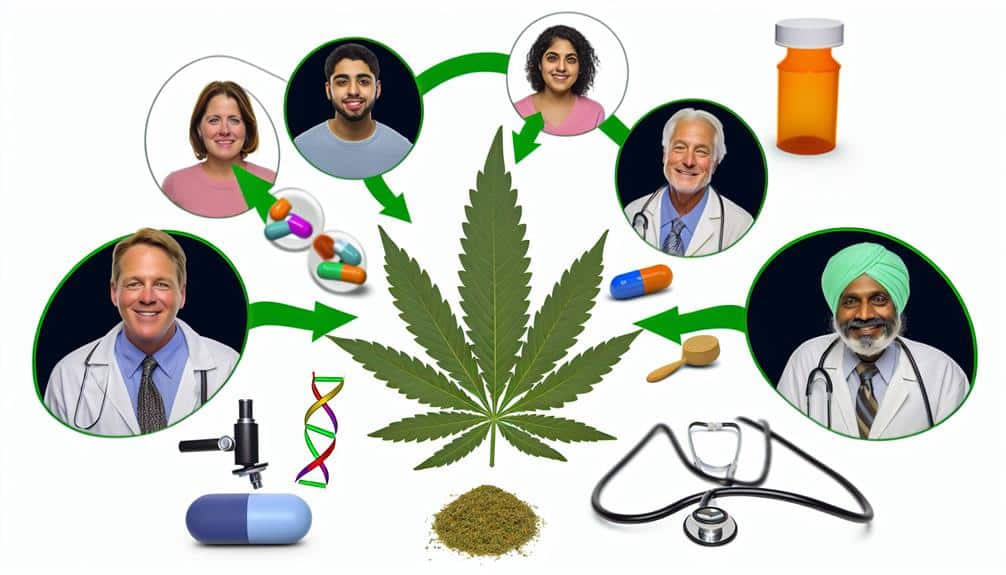You’re likely aware of the ongoing research at the University of Delaware, where scientists are exploring the medical potential of cannabis. Their focus? Unraveling how this plant can be used to treat conditions ranging from chronic pain to epilepsy. As we move forward, the question isn’t just about what therapeutic benefits we can extract from cannabis, but also how we can optimize these benefits while minimizing side effects. The results could shift the healthcare landscape in ways we’ve yet to fully grasp, and it’s worth keeping a close eye on these developments.
Table of Contents
The Legal Landscape of Cannabis in Delaware

Understanding the legal landscape of cannabis in Delaware is crucial as it shapes both the current state and future of cannabis research in the region. You need to know where we’re coming from to appreciate the strides made in Cannabis Regulation and Decriminalization Progress.
Not too long ago, Delaware was stringent on cannabis use. But in 2015, a bill decriminalizing possession of small amounts of cannabis for personal use was passed. This shift towards decriminalization was a significant step, reflecting broader societal acceptance of cannabis use.
However, it doesn’t stop there. The state is also making headway in cannabis regulation. Delaware has established a well-defined regulatory structure for medical cannabis that underpins safe and controlled use.
Your role now is to stay informed and compliant within this evolving landscape. As a professional dedicated to serving others, you should be aware of these changes. The regulatory landscape can impact your practice, research, or the advice you provide. So, as Delaware continues to navigate the complex world of cannabis regulation, make sure you’re on the right side of the law.
Medical Cannabis: Current Use and Research
Delving into the realm of medical cannabis, it’s essential to grasp its current uses and ongoing research in Delaware. This knowledge could reshape your understanding of this versatile plant and its potential benefits. The biochemistry of cannabis is complex and multifaceted; it comprises over 100 cannabinoids, each with unique medicinal properties. Notably, THC and CBD are most prevalent; research in Delaware is currently focused on understanding their therapeutic potential and enhancing patient accessibility.
You might be wondering about the current uses of medical cannabis. It’s primarily used to manage chronic pain, nausea, and muscle spasms—especially in patients with severe medical conditions. Additionally, it’s being researched for its potential to treat a range of diseases including epilepsy, multiple sclerosis, and even some types of cancer.
Patient accessibility is a vital aspect of medical cannabis use in Delaware. The state has implemented measures to ensure that those in need have ready access to this treatment option. This includes establishing compassion centers which provide medical cannabis to patients who’ve obtained a physician’s recommendation. With ongoing research paving the way for new applications and improved accessibility—the future of medical cannabis in Delaware looks promising.
The Potential Role Of Cannabis In Pain Management

The potential of cannabis in pain management is a topic you can’t afford to ignore, as it’s revolutionizing how we perceive and treat chronic pain conditions. Delving into the biochemistry of cannabis, you’ll discover a complex interplay between cannabinoids and the body’s endocannabinoid system. This interaction triggers a reduction in inflammation—a common cause of chronic pain.
Cannabis’s therapeutic applications extend beyond alleviating physical discomfort. It has also shown promise in helping patients manage the emotional turmoil that often accompanies chronic pain, providing a more holistic approach to treatment. However, it’s important to remember that everyone’s experience with cannabis will differ due to factors such as individual biochemistry and the strain of cannabis used.
Research in Delaware is spearheading efforts to understand these dynamics better. The objective is to develop tailored strategies that maximize the benefits of cannabis while minimizing any potential side effects. As you serve others in this field, you’ll find exploring the potential role of cannabis in pain management both rich and rewarding—promising hope for millions struggling with chronic pain.
Cannabis And Mental Health Treatment
While exploring the therapeutic potential of cannabis in pain management, it’s equally important to consider its role in mental health treatment. There’s growing evidence suggesting that cannabis—specifically CBD (a non-psychoactive compound)—can offer significant stress relief benefits. You may have already seen it being marketed as a natural way to manage anxiety and promote relaxation.
Moreover, there’s burgeoning interest in using cannabis for addiction recovery purposes. Delaware is currently examining how cannabis might serve as an alternative to opioids for those struggling with addiction since it doesn’t carry the same risk of physical dependency—making it potentially safer.
However, remember that mental health treatment often requires a comprehensive, multi-faceted approach. While cannabis may be a valuable tool in the toolbox, it isn’t a one-size-fits-all solution. It’s also important to carefully consider potential side effects and interactions with other medications.
As we continue to explore the full potential of cannabis, it’s clear that its role in mental health treatment warrants further study. This is an exciting time for cannabis research, and Delaware is at the forefront of these investigations.
Breakthroughs In Cancer Treatment With Cannabis

In exploring the expansive world of cannabis research, you’ll find intriguing breakthroughs in its potential use for cancer treatment. The field is ripe with possibilities—particularly in Delaware—where researchers are harnessing the power of cannabis genomics and cannabinoid receptors to transform cancer care.
Here are some groundbreaking developments you should be aware of:
- Researchers have discovered that cannabinoid receptors play a crucial role in tumor growth and spread.
- Active compounds in cannabis such as THC and CBD have shown potential in reducing tumor size.
- Genomic analysis of cannabis provides insights into the plant’s unique therapeutic properties.
- Clinical trials are underway to evaluate the safety and efficacy of cannabis-based cancer treatments.
- The potential use of cannabis as complementary therapy alongside traditional cancer treatments is being explored.
These developments aren’t merely academic pursuits—they’re potential lifelines for patients seeking alternatives to conventional treatment modalities. With every breakthrough, the future of cancer treatment in Delaware and beyond becomes brighter. It’s clear that cannabis has a promising role to play in the fight against cancer.
Cannabis Research In Neurological Disorders
Shifting our focus to neurological disorders, you’ll find that cannabis research is unearthing promising avenues for treating conditions like Alzheimer’s, Parkinson’s, and epilepsy. The neuroprotective properties of cannabis are gaining recognition for their potential to safeguard the brain against harm caused by these diseases.
Epilepsy management is one area where cannabis research has made significant strides. The use of cannabis-derived treatments like CBD oil has shown promise in reducing the frequency and severity of seizures—especially in treatment-resistant forms of epilepsy. This could revolutionize care for those living with epilepsy by providing a new therapeutic option where traditional medications have failed.
Alzheimer’s and Parkinson’s diseases could also benefit from cannabis research. Studies suggest that cannabinoids might slow disease progression by reducing inflammation and oxidative stress—both major contributors to neurodegeneration. This potential therapy could improve quality of life for patients and their caregivers.
As you continue your work serving others and improving health outcomes, it’s crucial to keep an eye on this rapidly evolving field. The promises of cannabis research in neurological disorders are just beginning to unfold—and Delaware could play a key role in shaping the future of this treatment.
The Impact On Opioid Epidemic: Cannabis As An Alternative

Building on our understanding of cannabis’s potential in neurological disorders, let’s now explore its possible role as an alternative solution to addressing the opioid epidemic. As you navigate this public health crisis, consider how increasing cannabis accessibility could be a game-changer.
Consider these potential impacts:
- Cannabis could provide a safer alternative for pain management, reducing reliance on opioids.
- Cannabis has been shown to have a lower addiction rate compared to opioids, playing a key role in addiction prevention.
- Increased cannabis accessibility could lower opioid overdose rates.
- The non-psychoactive components of cannabis like CBD could potentially be used to treat opioid addiction symptoms.
- Implementation of cannabis treatment options could decrease healthcare costs related to opioid addiction and overdoses.
You’re on the front lines of this epidemic, seeking ways to better serve your community. Cannabis might be part of the answer. By embracing cannabis as an alternative, you’re not just considering a new treatment option—you’re potentially saving lives. Remember—it’s not about replacing one drug with another; it’s about finding safer, effective ways to manage pain and prevent addiction.
Challenges Facing Cannabis Research And Development
What hurdles are we facing when it comes to expanding cannabis research and development?
The two major challenges are research funding and regulatory hurdles.
Funding for research is significant issue since many funding bodies do not yet see cannabis studies as a priority. This lack of financial support stifles the growth of cannabis research—making it difficult to explore the full potential of this plant as a medical aid. Therefore, we need more advocacy for funding so that cannabis research can progress.
Regulatory hurdles also pose a significant challenge. Despite the medicinal potential of cannabis, it’s still classified as a Schedule I drug by the federal government—implying a high potential for abuse and no accepted medical use. This classification makes it difficult to conduct large-scale, controlled studies—limiting our understanding of the plant’s therapeutic benefits.
Moreover, policies regulating the cultivation, distribution, and use of cannabis often vary widely from state to state—causing further complications for researchers. This inconsistent landscape means you can’t easily compare findings or establish standard treatment protocols.
These challenges need to be addressed if we’re to unlock the full potential of cannabis in Delaware’s medical landscape.
Public Opinion And Future Policy Directions

As we move forward, it’s essential to consider public opinion on cannabis and how it can shape future policy directions in Delaware. Public perception plays a significant role in the evolution of laws and regulations around cannabis use.
Understanding the nuances of public opinion towards cannabis can help ensure that policy reform aligns with community desires and needs. Here are few key points to consider:
- There’s rising public support for medical cannabis due to growing awareness of its potential health benefits.
- However, concerns persist about possible misuse and safety—especially among parents and educators.
- Many business owners are interested in the potential economic boost from a regulated cannabis market.
- Healthcare professionals are increasingly open to the therapeutic potential of cannabis, yet they seek more robust research.
- Law enforcement agencies express concerns about potential legal complexities and public safety issues.
As you serve your communities, it’s crucial to weigh these varied opinions in shaping future policy. This balance will ensure that any policy reform is responsible, sustainable, and in the best interest of all Delaware citizens.
Economic Implications Of Cannabis Healthcare Integration
Given the diverse perspectives on cannabis use, it’s important to also consider its potential economic implications—especially in relation to healthcare integration. Incorporating cannabis into Delaware’s healthcare system could significantly impact your state’s economy.
Cannabis taxation—a major source of revenue in states where the drug is legal—could bolster Delaware’s coffers. This additional income could be channeled into public healthcare—improving services and reducing the burden on taxpayers. Additionally, growth in the cannabis industry would likely create jobs—contributing to a robust economy.
But there’s more to it than just economics. Market regulation is crucial for ensuring industry integrity and public safety. Regulation would guard against monopolies, maintain product quality, and ensure fair pricing. It could also reduce illegal trade by providing a safer, legal alternative.
Moreover, integrating cannabis into healthcare could lead to lower healthcare costs by offering a potentially less expensive natural alternative to some traditional treatments. Reduced healthcare expenses could result in savings for both individuals and the state.
Conclusion
The road to unlocking cannabis’ full potential in healthcare may be bumpy—but here in Delaware—we’re blazing a trail. We’re living in an exciting era of medical innovation that might revolutionize pain management, mental health care—and even cancer treatment! However—the path forward isn’t without its challenges—and your support is crucial.
The sky’s the limit with cannabis research, and with public acceptance—we could turn over a new leaf in healthcare—making a world of difference for patients.
I invite you to join us on this journey. Whether you’re just curious or seeking a more natural and effective treatment option—Doc Greenly is here to help. Visit us online at docgreenly.com or give us a call at (302) 343-2829. We’d be delighted to answer your questions and guide you through the benefits and potential of medical cannabis.
Let’s explore this new frontier in healthcare together!

